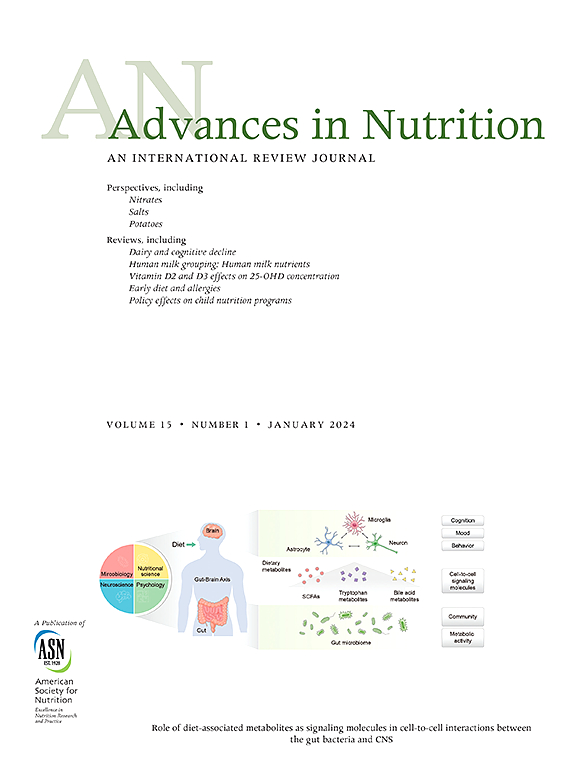Homocysteine and Multiple Health Outcomes: An Outcome-Wide Umbrella Review of Meta-analyses and Mendelian Randomization Studies
IF 9.2
1区 医学
Q1 NUTRITION & DIETETICS
引用次数: 0
Abstract
Elevated levels of homocysteine (Hcy) are associated with various health outcomes. We aimed to systematically assess the credibility and certainty of evidence of associations of Hcy and Hcy-lowering therapies with various health outcomes. We retrieved observational meta-analyses examining the associations between Hcy and health outcomes, interventional meta-analyses investigating health outcomes related to Hcy-lowering treatments, and Mendelian randomization (MR) studies exploring the causal associations of Hcy with health outcomes to perform an umbrella review. A total of 135 observational meta-analyses, 106 MR studies, and 26 interventional meta-analyses were included. Among observational studies, 10 associations of diseases/outcomes were classified as highly suggestive; only 1 outcome (digestive tract cancer) was supported by convincing evidence (class I; odd ratio = 1.27, 95% confidence interval = 1.16, 1.40; P = 6.79 × 10-7; I2 = 0, 95% prediction interval excluding null, >1000 cases; P > 0.1 for tests of both small-study effects and excess significance bias). In MR studies, 5 outcomes associated with Hcy presented robust evidence (P < 0.01, power >80%). Among 25 outcomes explored by both observational meta-analyses and MR studies, 7 had consistent results, indicating that elevated Hcy is causally associated with an increased risk of these outcomes. The 3 types of studies collectively suggested that the association of stroke with Hcy was supported by observational studies, causally by MR studies, and further validated by intervention meta-analyses showing that Hcy-lowering with folic acid significantly reduced risk of stroke. For dementia and colorectal cancer, Hcy was significantly associated in meta-analyses of observational studies and folic acid decreased disease risks in interventional meta-analyses. The current umbrella review indicates that convincing evidence for a definitive role of Hcy exposure solely exists in the context of digestive tract cancer excluding bias; however, Hcy may not be causal for this disease. All the 3 types of studies collectively support that Hcy is a key causal risk factor, and Hcy-lowering (specifically with folic acid) may serve as an effective intervention for stroke.
This trial was registered at PROSPERO as CRD42024541335.
同型半胱氨酸和多种健康结果:荟萃分析和孟德尔随机化研究的综合综述
高水平的同型半胱氨酸(Hcy)与各种健康结果相关。我们的目的是系统地评估Hcy和降低Hcy治疗与各种健康结果相关证据的可信度和确定性。我们检索了检验Hcy与健康结果之间关系的观察性荟萃分析、调查与降低Hcy治疗相关的健康结果的干入性荟萃分析,以及探索Hcy与健康结果因果关系的孟德尔随机化(MR)研究,以进行总揽性回顾。共纳入135项观察性荟萃分析、106项磁共振研究和26项介入性荟萃分析。在观察性研究中,10种疾病/结果的关联被归类为高度提示性;只有1个结局(消化道癌)有令人信服的证据支持(I类;奇比= 1.27,95%置信区间= 1.16,1.40;P = 6.79 × 10-7;I2 = 0, 95%预测区间排除null, >;1000例;P比;对于小型研究效应和过度显著性偏差的检验均为0.1)。在磁共振研究中,与Hcy相关的5个结果提供了强有力的证据(P <;0.01,功率>;80%)。在观察性荟萃分析和MR研究探讨的25个结果中,有7个结果一致,表明Hcy升高与这些结果的风险增加有因果关系。这三种类型的研究共同表明,观察性研究支持Hcy与卒中的关联,MR研究与Hcy有因果关系,并通过干预荟萃分析进一步证实,叶酸降低Hcy可显著降低卒中风险。在观察性研究的荟萃分析中,对于痴呆和结直肠癌,Hcy显著相关;在介入性荟萃分析中,叶酸降低疾病风险。目前的综述表明,排除偏倚,Hcy暴露的明确作用仅存在于消化道癌症的背景下;然而,Hcy可能不是导致这种疾病的原因。所有这三种类型的研究共同支持Hcy是一个关键的因果危险因素,降低Hcy(特别是叶酸)可能作为卒中的有效干预措施。该试验在普洛斯彼罗注册为CRD42024541335。
本文章由计算机程序翻译,如有差异,请以英文原文为准。
求助全文
约1分钟内获得全文
求助全文
来源期刊

Advances in Nutrition
医学-营养学
CiteScore
17.40
自引率
2.20%
发文量
117
审稿时长
56 days
期刊介绍:
Advances in Nutrition (AN/Adv Nutr) publishes focused reviews on pivotal findings and recent research across all domains relevant to nutritional scientists and biomedical researchers. This encompasses nutrition-related research spanning biochemical, molecular, and genetic studies using experimental animal models, domestic animals, and human subjects. The journal also emphasizes clinical nutrition, epidemiology and public health, and nutrition education. Review articles concentrate on recent progress rather than broad historical developments.
In addition to review articles, AN includes Perspectives, Letters to the Editor, and supplements. Supplement proposals require pre-approval by the editor before submission. The journal features reports and position papers from the American Society for Nutrition, summaries of major government and foundation reports, and Nutrient Information briefs providing crucial details about dietary requirements, food sources, deficiencies, and other essential nutrient information. All submissions with scientific content undergo peer review by the Editors or their designees prior to acceptance for publication.
 求助内容:
求助内容: 应助结果提醒方式:
应助结果提醒方式:


